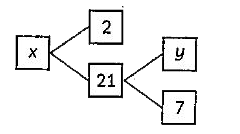Calculate xy

14
3
15
18
The correct Answer is:A
Step by step video, text & image solution for Calculate (x)/(y) by Maths experts to help you in doubts & scoring excellent marks in Class 10 exams.
Updated on:21/07/2023Topper's Solved these Questions
- SAMPLE PAPER 6BOOK - EDUCART PUBLICATIONCHAPTER - SAMPLE PAPER 6EXERCISE - SECTION C
10 Videos
- SAMPLE PAPER 6BOOK - EDUCART PUBLICATIONCHAPTER - SAMPLE PAPER 6EXERCISE - SECTION- A
20 Videos
- SAMPLE PAPER 6BOOK - EDUCART PUBLICATIONCHAPTER - SAMPLE PAPER 6EXERCISE - SECTION- C
10 Videos
- SAMPLE PAPER 5BOOK - EDUCART PUBLICATIONCHAPTER - SAMPLE PAPER 5EXERCISE - PART - B (SECTION - V)
4 Videos
- SAMPLE PAPER 7BOOK - EDUCART PUBLICATIONCHAPTER - SAMPLE PAPER 7EXERCISE - PART - B (SECTION - V)
8 Videos
Similar Questions
Knowledge Check
Choose the most appropriate option.
Calculate ∣∣ ∣ ∣∣xyx+yyx+yxx+yxy∣∣ ∣ ∣∣Ax3+y3Bx3+y3+3x2y+3xy2+1C−2(x3+y3)D2(x3+y3)
A force of 20 N is inclined to the x-axis at an angle of 60∘. Calculate its x and y components.
View Solution250 mL of x M solution and 500 mL of y M solution of a solute A are mixed and diluted to 2 litre to produce a final concentration of 1.6 M.
if x:y=5:4 calculate x and y .
View SolutionFor the reaction : A+2B→P the rate law is given by rate =k[A][B]2
From the following data , calculate x and y .
 .
.
View Solution30 ml of a solution containing 9.15 gm/litre of an oxalate KxHy(C2O4)znH2O are rerquired for titrating 27 ml of 0.12 N NaOH and 36 ml of 0.12NKMnO4 separately. Calculate x,y,z and n. Assume all H atoms (except H2O) are replaceable and x,y,z are in the simple ratio of gm atoms.
View SolutionCalculate the area of the region bounded by the parabolas y2=6xandx2=6y.
View SolutionIn a certain region of space, the electric potential is V(x,y,z)=Axy−Bx2+Cy, where A, B and C are positive constants.
(a) Calculate the x, y and z- components of the electric field.
(b) At which points is the electric field equal to zero?
View SolutionCalculate the area of the region bounded by thr curves x=log2y,y=2x−x2 and the lines x(x−2)=0.
View Solution
